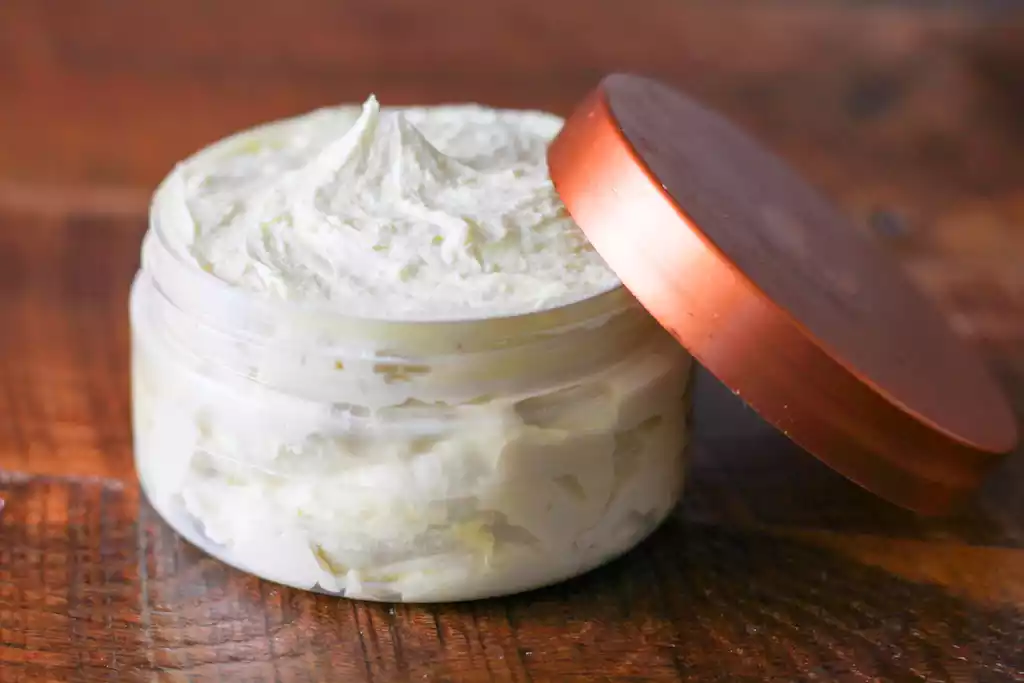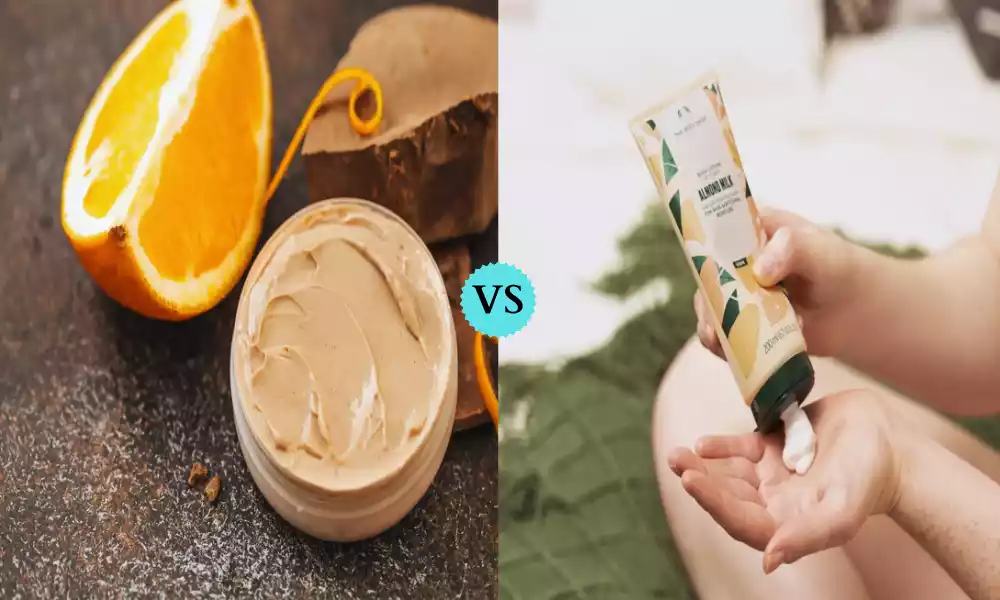Body Butter and Body Lotion are two popular skincare products designed to nourish and moisturize the skin. While both serve the primary purpose of keeping the skin hydrated, they differ significantly in their composition, texture, and ideal usage. Understanding these differences is essential for choosing the right product that best suits your skin type and specific needs. We will delve into the distinctions between Body Butter and Body Lotion, helping you make informed decisions for your skincare routine.
What is Body Butter?

Body Butter is a rich and thick skincare product made from a combination of natural ingredients, typically including shea butter, cocoa butter, and various oils such as coconut, almond, or jojoba oil. It is formulated to provide intense moisturization and nourishment to the skin. Body butter has a creamy texture that is thicker than body lotion, and it tends to stay on the skin’s surface for longer, creating a protective barrier.
This makes it particularly effective for people with very dry or dehydrated skin, especially during cold or dry weather. Body butter is also known for its ability to reduce the appearance of scars, stretch marks, and promote skin elasticity. It often comes in various natural and earthy fragrances, and its luxurious consistency makes it ideal for targeted application on dry patches or as an occasional deep moisturizing treatment.
Types of Body Butter
Types of Body Butter:
-
- Shea Butter Body Butter: Contains high amounts of shea butter, known for its deep moisturizing properties. Ideal for dry and sensitive skin.
- Cocoa Butter Body Butter: Rich in cocoa butter, it offers excellent hydration and can help with skin elasticity. Often used for scar and stretch mark reduction.
- Mango Butter Body Butter: Made from mango seed kernels, it is lightweight and easily absorbed, suitable for all skin types.
- Coconut Oil Body Butter: Infused with coconut oil, it provides intense hydration and a tropical scent. Best for dry and flaky skin.
- Jojoba Oil Body Butter: Contains jojoba oil, which mimics the skin’s natural oils. Suitable for various skin types, especially acne-prone or sensitive skin.
- Avocado Butter Body Butter: Featuring avocado oil, it’s rich in vitamins and ideal for nourishing and revitalizing the skin.
- Almond Butter Body Butter: Formulated with almond oil, it offers hydration and can soothe irritated skin. Great for daily use.
- Whipped Body Butter: A lighter, airy texture of body butter that’s easy to spread and absorbs quickly while still providing excellent moisturization.
- Fragranced Body Butter: Body butter infused with various scents, from floral to fruity, catering to different fragrance preferences.
- Organic and Natural Body Butter: Made from organic and natural ingredients, free from synthetic additives and chemicals, suitable for those with sensitive skin or environmental concerns.
Benefits of Body Butter
Benefits of Body Butter:
-
- Intense Moisturization: Body butter is exceptionally effective at providing deep and long-lasting hydration to the skin, making it ideal for dry and dehydrated skin types.
- Nourishment: The rich and creamy texture of body butter contains essential fatty acids, vitamins, and natural oils that nourish and replenish the skin.
- Skin Barrier: Body butter forms a protective barrier on the skin’s surface, helping to lock in moisture and prevent water loss, especially in harsh weather conditions.
- Improves Skin Texture: Regular use of body butter can help improve the texture of the skin, making it softer, smoother, and more supple.
- Reduces Skin Issues: Body butter can help alleviate skin issues such as dryness, flakiness, itching, and rough patches.
- Scar and Stretch Mark Reduction: Certain body butters, like cocoa butter and shea butter, are known for their ability to reduce the appearance of scars and stretch marks over time.
- Skin Elasticity: Body butter can enhance skin elasticity, which is particularly beneficial for pregnant women to prevent stretch marks and for aging skin to maintain firmness.
- Soothing Properties: Some body butters, like aloe vera-infused variants, have soothing properties that can calm irritated or sunburned skin.
- Natural Ingredients: Many body butters are made from natural ingredients, making them a preferred choice for individuals seeking chemical-free skincare options.
- Fragrance: Body butter often comes in a variety of fragrances, providing a pleasant and long-lasting scent to the skin.
- Luxurious Experience: Applying body butter can be a luxurious and indulgent part of your skincare routine, providing a spa-like experience at home.
- Targeted Application: Its thick consistency allows for precise application on specific areas that require extra care, such as elbows, knees, and heels.
- Customization: You can choose body butter types that cater to your specific skin needs, whether it’s deep moisturization, scar reduction, or fragrance preference.
What is Body Lotion?

Body lotion is a popular skincare product designed to provide essential hydration and moisture to the skin. It is typically composed of a mixture of water, oils, emollients, and various beneficial ingredients.
Body lotion distinguishes itself by its lightweight and fluid texture, which allows for easy application and rapid absorption into the skin. This quick absorption ensures that it leaves little to no residue on the skin’s surface, making it an ideal choice for daily use. Body lotion serves to prevent dryness, maintain skin softness, and promote a healthy complexion.
It is suitable for a wide range of skin types, including normal, combination, and slightly dry skin, making it a versatile and practical addition to daily skincare routines. Available in an array of fragrances, body lotion offers a customizable sensory experience while delivering essential moisture to the skin, contributing to its overall well-being.
Types of Body Lotion
Types of Body Lotion:
-
- Moisturizing Body Lotion: Provides essential hydration for everyday use, ideal for normal to slightly dry skin.
- Sensitive Skin Body Lotion: Formulated with gentle ingredients to soothe and protect sensitive or easily irritated skin.
- Sunscreen Body Lotion: Combines SPF protection with hydration, shielding the skin from harmful UV rays.
- Anti-Aging Body Lotion: Contains ingredients like retinol or hyaluronic acid to reduce signs of aging, such as fine lines and wrinkles.
- Whitening or Brightening Body Lotion: Designed to even out skin tone and reduce the appearance of dark spots or hyperpigmentation.
- Fragranced Body Lotion: Offers a variety of scents, from floral to fruity, for a pleasant and lasting fragrance.
- Natural and Organic Body Lotion: Comprises natural and organic ingredients, free from synthetic additives and chemicals, suitable for those with environmental or skin sensitivity concerns.
- Intensive Hydration Body Lotion: Delivers deep moisturization for dry or dehydrated skin, often containing ingredients like shea butter or coconut oil.
- Aloe Vera Body Lotion: Contains aloe vera extracts, known for their soothing and hydrating properties, making it suitable for sunburned or irritated skin.
- Self-Tanning Body Lotion: Provides gradual self-tanning effects while moisturizing the skin, creating a sun-kissed glow.
- Exfoliating Body Lotion: Contains exfoliating agents like alpha hydroxy acids (AHAs) to remove dead skin cells and promote a smoother texture.
- Mens Body Lotion: Formulated with scents and ingredients catering to men’s skincare needs, often featuring woodsy or musky fragrances.
- Women’s Body Lotion: Tailored to women’s preferences, it may include floral, sweet, or feminine scents.
These various types of body lotions cater to different skin concerns and preferences, allowing individuals to choose a product that best suits their specific needs and desires.
Benefits of Body Lotion
Benefits of Body Lotion:
-
- Hydration: Body lotion provides essential moisture to the skin, preventing dryness and keeping it well-hydrated.
- Softens Skin: Regular use of body lotion can make the skin feel softer and smoother.
- Prevents Dryness: It helps to maintain the skin’s natural moisture balance, preventing it from becoming dry and flaky.
- Improves Skin Texture: Body lotion can improve the overall texture of the skin, making it appear healthier and more youthful.
- Soothes Irritation: Some body lotions contain ingredients with soothing properties that can calm irritated or inflamed skin.
- Fragrance: Many body lotions come in a variety of pleasing fragrances, providing a pleasant and lasting scent to the skin.
- Fast Absorption: Body lotion is typically quick to absorb into the skin, leaving no greasy or sticky residue.
- All-over Use: It can be applied generously to the entire body, ensuring comprehensive hydration.
- Skin Protection: Certain body lotions contain ingredients like antioxidants or SPF, offering protection against environmental damage and harmful UV rays.
- Customization: There is a wide variety of body lotions available, each tailored to specific skin types and concerns, allowing individuals to choose the right product for their needs.
- Convenience: Body lotion is easy to apply and is available in various packaging options, including bottles with pumps or flip caps.
- Affordability: It is generally more budget-friendly compared to some other skincare products, making it accessible for regular use.
Incorporating body lotion into your daily skincare routine can contribute to healthier, well-moisturized skin and enhance your overall skincare regimen.
Comparison Table of Body Butter and Body Lotion
Here’s a comparison table outline highlighting the key differences between body butter and body lotion:
| Aspect | Body Butter | Body Lotion |
|---|---|---|
| Texture | Thick and creamy | Lightweight and fluid |
| Ingredients | Shea butter, cocoa butter, natural oils | Water, oils, emollients |
| Skin Types | Dry, very dry, cold weather | Normal, combination, humid weather |
| Absorption Rate | Slower absorption | Quick absorption |
| Residue | Leaves a protective layer | Minimal residue |
| Specific Benefits | Deep moisturization, scar/stretch mark reduction | Daily hydration, soothing properties |
| Fragrance | Rich, long-lasting scents | Light, subtle fragrances |
| Packaging | Jars or tubs | Bottles with pumps or flip caps |
| Recommended Usage | Targeted areas, occasional deep hydration | All-over daily application |
| Price Range | Generally more expensive | Budget-friendly |
| Availability | Specialty stores and online | Drugstores, supermarkets, online retailers |
This table provides a concise overview of the primary differences between body butter and body lotion, helping consumers make informed choices based on their skin type and specific skincare needs.
When and How to Use
The timing and method of using body butter and body lotion can impact their effectiveness in maintaining well-hydrated skin. Here’s when and how to use these skincare products:
When to Use Body Butter:
- After Bath or Shower: Body butter is most effective when applied to clean, slightly damp skin. After a bath or shower, pat your skin dry with a towel, leaving it slightly moist.
- Dry or Cold Weather: Body butter is especially beneficial during dry, cold weather when the skin is prone to dryness and dehydration. It helps create a protective barrier against harsh elements.
- Before Bed: Applying body butter before bedtime allows it to work its magic overnight, providing deep moisturization and helping the skin recover.
- Targeted Areas: Use body butter on areas that need extra attention, such as elbows, knees, heels, and areas with scars or stretch marks.
How to Use Body Butter:
- Warm the Product: Take a small amount of body butter and warm it between your palms by rubbing them together until it softens.
- Massage Gently: Apply the body butter to your skin using gentle, upward strokes. Massage it in a circular motion, focusing on the areas that need more hydration.
- Allow Absorption Time: Body butter may take a bit longer to absorb than body lotion. Allow it to fully soak into your skin before dressing to prevent residue on clothing.
When to Use Body Lotion:
- After Bath or Shower: Like body butter, body lotion is most effective when applied to clean, slightly damp skin. After bathing, pat your skin dry, leaving it slightly damp.
- Daily Use: Body lotion is suitable for daily use, especially in warmer or humid climates, where a lighter moisturizer is preferable.
- Morning Routine: Apply body lotion in the morning to start the day with well-moisturized and soft skin. If your lotion contains SPF, it can double as sun protection.
How to Use Body Lotion:
- Dispense the Product: Take the desired amount of body lotion onto your palms or directly onto your skin, depending on the size of the area you’re covering.
- Spread Evenly: Rub your hands together to distribute the lotion and then apply it evenly to your skin. Start with your arms and work your way down to your legs and feet.
- Use Upward Strokes: Gently massage the lotion into your skin using upward strokes. This promotes circulation and helps with absorption.
- Apply to Neck and Chest: Extend the application to your neck and chest area, which are also prone to dryness and signs of aging.
- Allow Absorption: Body lotion typically absorbs quickly, so you can get dressed shortly after application.
- Reapply as Needed: If you have very dry skin or are exposed to harsh environmental conditions, consider reapplying body lotion throughout the day.
Remember that consistent use of body butter or body lotion can help maintain healthy, well-hydrated skin. Choose the product that suits your skin type, climate, and preferences, and integrate it into your daily skincare routine for the best results.
Addressing Common Misconceptions
Addressing common misconceptions about body butter and body lotion can help individuals make more informed decisions about their skincare routines. Here are a few common myths and their truthful explanations:
Misconception 1: Body butter and body lotion are the same thing.
- Truth: While both products moisturize the skin, they differ in texture, thickness, and ideal use. Body butter is thicker and more suitable for deep hydration, while body lotion has a lighter texture, ideal for daily use and in warmer climates.
Misconception 2: Body butter is too heavy for all skin types.
- Truth: Body butter can be beneficial for dry or very dry skin types, especially during colder months. Acne sufferers or individuals with oily skin should use caution as these may not be appropriate remedies for them. There are variations of body butter with lighter textures available for different skin needs.
Misconception 3: Body lotion can’t provide deep hydration.
- Truth: While body lotion is lighter than body butter, it can still provide effective hydration, especially when used consistently. Some body lotions are formulated to offer deep moisturization without feeling heavy on the skin.
Misconception 4: Body butter causes breakouts.
- Truth: Body butter’s thickness may be a concern for individuals with oily or acne-prone skin, as it could potentially clog pores. Choosing non-comedogenic body butter or using it sparingly on targeted areas can help minimize this risk.
Misconception 5: Fragrance-free products are always better for sensitive skin.
- Truth: While fragrance-free products can be gentler on sensitive skin, not all fragrances are harmful. Some body butters and lotions contain natural fragrances that are less likely to cause irritation. It’s essential to read ingredient labels and consider individual sensitivities.
Misconception 6: Expensive body butter or lotion is always better quality.
- Truth: Price does not always reflect product quality. Effective body butter and lotion can be found in a range of price points. It’s crucial to look at the ingredients and suitability for your skin type rather than relying solely on price.
Misconception 7: You should apply body butter or lotion immediately after a shower.
- Truth: It’s generally recommended to apply body butter or lotion to slightly damp skin after a shower or bath to lock in moisture. Allowing your skin to air dry for a few minutes is also acceptable.
Misconception 8: Body butter can’t be used in hot or humid climates.
- Truth: While body butter may feel heavier, some people still prefer it in hot or humid weather for its moisturizing benefits. You can use a lighter hand when applying or choose a lighter-textured body butter for these conditions.
Clearing up these misconceptions can help individuals make more informed choices about their skincare products, leading to healthier and better-hydrated skin.
Final Thoughts
Body Butter and Body Lotion are essential skincare products with distinct purposes and textures. Body butter, with its rich and creamy consistency, is best suited for intense moisturization and addressing specific skin concerns like scars and stretch marks.
It is particularly effective in cold or dry weather. On the other hand, body lotion, known for its lightweight and fast-absorbing formula, is ideal for daily use, providing hydration and maintaining skin softness, especially in warmer climates. Choosing between the two depends on individual skin type, climate, and skincare goals, ensuring that everyone can achieve well-moisturized and healthy skin.



